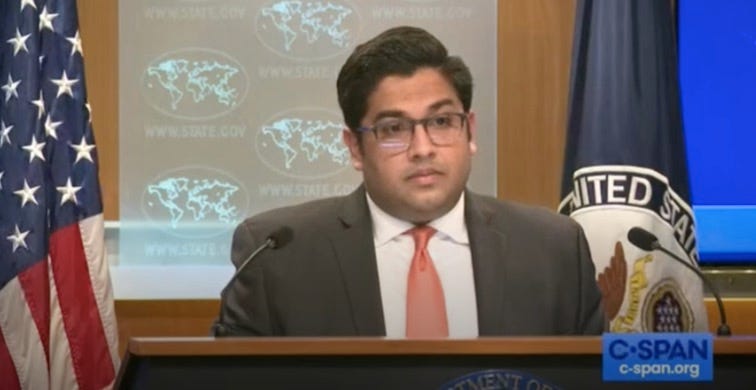State Dept. Claims it Upholds Laws, but Won't Acknowledge Israel's Nukes, Flouting Law Requiring Funding Cutoff to Proliferators
Will Not Address Nicaragua's Genocide Case at World Court and Possible Applicability to US
Many thanks for video to
:[Reminder: If you can please support this work.]
Today at the State Department, following several back and forths with other reporters about the Leahy Law, which is supposed to prohibit funding to foreign military units implicated in human rights violations, the deputy spokesperson, Vedant Patel, claimed the US upholds such laws.
So I asked about US law that would cut off all funding to a country that has acquired nuclear weapons, as Israel has.
This issue was raised by Archbishop Desmond Tutu in his last article, an admonishment to this administration, headlined “Joe Biden should end the US pretence over Israel’s ‘secret’ nuclear weapons.”
The subhead was: “The cover-up has to stop – and with it, the huge sums in aid for a country with oppressive policies towards Palestinians.”
The Archbishop noted specifically: “Amendments by former Senators Glen—Stuart Symington and John Glenn … ban US economic and military assistance to nuclear proliferators and countries that acquire nuclear weapons.” He noted that Israel not only got nuclear weapons, but also: “There is overwhelming evidence that it offered to sell the apartheid regime in South Africa nuclear weapons in the 1970s and even conducted a joint nuclear test. The US government tried to cover up these facts.”
Tutu added: “The US government should uphold its laws and cut off funding to Israel because of its acquisition and proliferation of nuclear weapons.”
I’ve raised this issue before to Washington insiders. (Longer piece on this issue forthcoming.)
It has been raised recently by James Bamford in “The Nuclear Explosion That Makes US Aid to Israel Illegal” and Gerry Condon: “‘The Law Is Simple’: Israel’s Unregulated Nukes Mean Biden Must Halt Military Aid.”
The State Dept. has been claiming that there are no double standards. I agree. Given that the invasion of Iraq was justified on the basis of a pack of lies about non-existent Iraqi WMDs and with escalating US support for Israel and sanctions on Iran and other countries, we’re up to triple and quadruple standards.
I also asked about the Nicaraguan case at the International Court of Justice against Germany for violations of the Convention on the Prevention and Punishment of the Crime of Genocide.
A decision in the case is expected Tuesday.
Specifically, Nicaragua’s lawsuit against Germany under the Genocide Convention charges it is “enabling Israel to perpetrate genocidal acts.”
“Germany has provided political, financial and military support to Israel fully aware at the time of authorization that the military equipments would be used in the commission of great breaches of international law by this State and in disregard of its own obligations.”
Veterans For Peace raised the issue of the Leahy Law and other US laws being violated with respect to US aid to Israel earlier this year. And they recently put out a statement on Israel’s nukes.
State Dept. transcript (I try to correct the mistakes on their transcripts, as best I can, but take with a grain of salt):
HUSSEINI: Let me try to approach the whole Leahy Law thing in one or two different ways. You say that U.S. law is applied systematically throughout. Does Israel have nuclear weapons? Because there is U.S. law that says that there should be a funding cutoff under the Arms Export Control Act and the Glenn-Symington Amendments that says that there shouldn’t be aid to nuclear proliferators, and Israel is a damn sure nuclear proliferator. But last time I asked, you folks won’t even acknowledge the existence of Israel’s massive nuclear arsenal.
PATEL: Yeah, I don’t – I still don’t have a comment for you on that, Sam.
HUSSEINI: But U.S. law is applied systematically, but you won’t even acknowledge the existence of --
PATEL: Of course U.S. law is applied systematically.
HUSSEINI: But you won’t even acknowledge the empirical reality of a nuclear weapons arsenal.
PATEL: Don’t have anything for you on that.
HUSSEINI: Okay, all right. Let me try a different tack then. Tomorrow there will be a decision issued by the International Court of Justice. Nicaragua invoked the Convention on the Prevention and Punishment of the Crime of Genocide – not just simply to punish genocide but to attempt to prevent it in real time. Nicaragua’s lawsuit says that it is, quote, “enabling Israel to [perpetuate] genocidal acts.” Quote, “Germany has provided political, financial and military support to Israel fully aware at the time of authorization that the military equipments would be used in the commission of great breaches of international law by this State and in disregard of its own obligations.”
As I understand it, Nicaragua is doing this against Germany and not the U.S. because the U.S. has a reservation in the Genocide Convention saying that it will not adhere to any judgments by the International Court of Justice. But it doesn’t have to invoke that. My question to you is: Would the United States invoke that; or, if a state wanted to go to the International Court, will the United States actually adhere to international law and say we will not invoke this way of bailing out of the legal system, we will actually abide by a court decision?
PATEL: Sam, let me say a couple of things there. First, we’ve been incredibly clear on this dating back to a number of months that we find allegations of genocide in this current, ongoing conflict in Gaza to continue to be unfounded. That was the case previously when similar matters were brought before the ICJ, and that continues to be the case. And let me just say when it comes to our partners in Germany, they share our convergence on the importance of doing everything we can to make sure hostages are released, to make sure that there is more humanitarian aid going into Gaza, and that everything can be done possible to make sure that this conflict ends as quickly as we can.
HUSSEINI: But I’m not asking you for your alleged assessment. I’m asking you: Will you adhere to a court ruling from the World Court?
PATEL: I’m just not going to engage in hypotheticals, Sam.
Go ahead, Ellen.
HUSSEINI: No, no, it’s not a hypothetical. (That is, I was asking for them to say now that they will abide by adjudication by the World Court, which they obviously wouldn’t do. This is especially notable since Nicaragua won a World Court judgement against the US for its war on Nicaragua in the 1980s and ignored the ruling.)
Also see:





